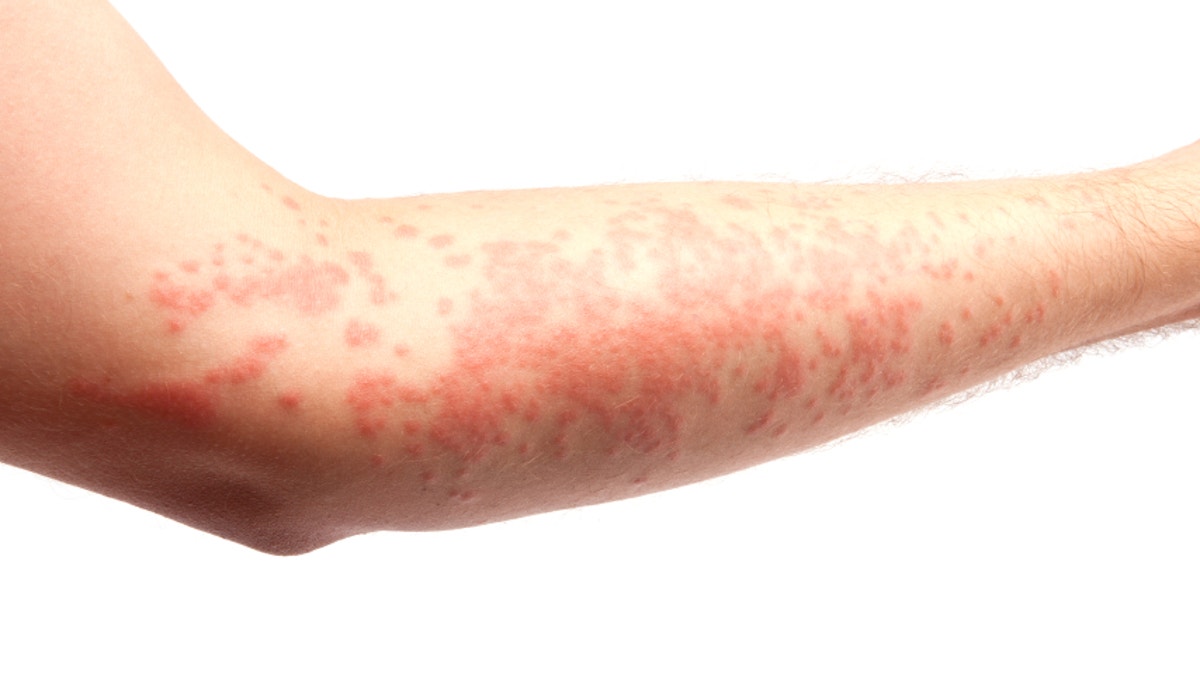
arm covered in a skin allergy,hives
In a new review of previous research, children who took antibiotics in their first year of life were about 40 percent more likely to develop eczema, an itchy skin disorder.
Kids' exposure to antibiotics taken by their mothers during pregnancy was not tied to the common rash, however, according to the results published in the British Journal of Dermatology
Experts said the new study supports the idea that antibiotics destroy intestinal microbes that play an important role in the immune system's development after birth.
The "hygiene hypothesis" suggests that babies and children whose immune systems are not exposed to enough challenges because their environment is too clean may be prone later in life to immune overreactions like allergies and asthma.
This study brings us closer to understanding the possible link between antibiotics and eczema, Dr. Ruchi Gupta, director of the program for maternal and child health at Northwestern School of Medicine in Chicago, told Reuters Health by email.
"They may be linked through the hygiene hypothesis," said Gupta, who was not involved in the new study. Throwing one element of the delicate developing immune system off-kilter could result in allergic skin reactions like eczema, she said.
Eczema is a common skin disorder, especially among children, marked by itchy, red skin. Between 10 and 20 percent of children experience symptoms of the disease, and more than half of them continue to have symptoms into adulthood, according to the National Institutes of Health.
Patients are often prescribed steroid medications to treat the problem.
Previous research had suggested that early life exposure to antibiotics may lead to an increased risk for eczema, but the new review is the first to consolidate available results from several studies.
Researchers led by Dr. Teresa Tsakok of Guy's and St Thomas' Hospital NHS Foundation Trust in London, UK, evaluated the results of 20 studies of antibiotic use, either prenatally or in the first year of life, in connection with later skin problems.
They found no link between prenatal antibiotic exposure and eczema, but exposure to the drugs in the first year of life increased the risk for the disease by up to 40 percent.
The more antibiotics a baby took, the higher the risk. With each additional round of antibiotics, eczema risk rose by seven percent. Broad-spectrum antibiotics, like amoxicillin, appeared to have the strongest effect.
Gupta said it's possible that the researchers overlooked some cases of "reverse causation," in which infants with eczema have more skin infections that may require antibiotics and confound the results, but the authors acknowledged that limitation and the findings are still valid.
Tsakok and her coauthors did not respond by press time to a request for comments.
"The study clearly supports the theory that antibiotics in infancy increase the risk of eczema," said Dr. Thomas Abrahamsson, a pediatrician who studies skin disorders at Linköping University in Sweden.
But, he told Reuters Health, there was another weakness in the review. Some of the studies it included lacked precise information about when eczema symptoms began and when antibiotics were first administered.
The onset of eczema is most often before one year of age, so if symptoms began before antibiotics were given, those children or studies should have been excluded, Abrahamsson said.
"The conclusion of the article, however, is sound," Abrahamsson said. "Antibiotics should only be used when it is really necessary."
